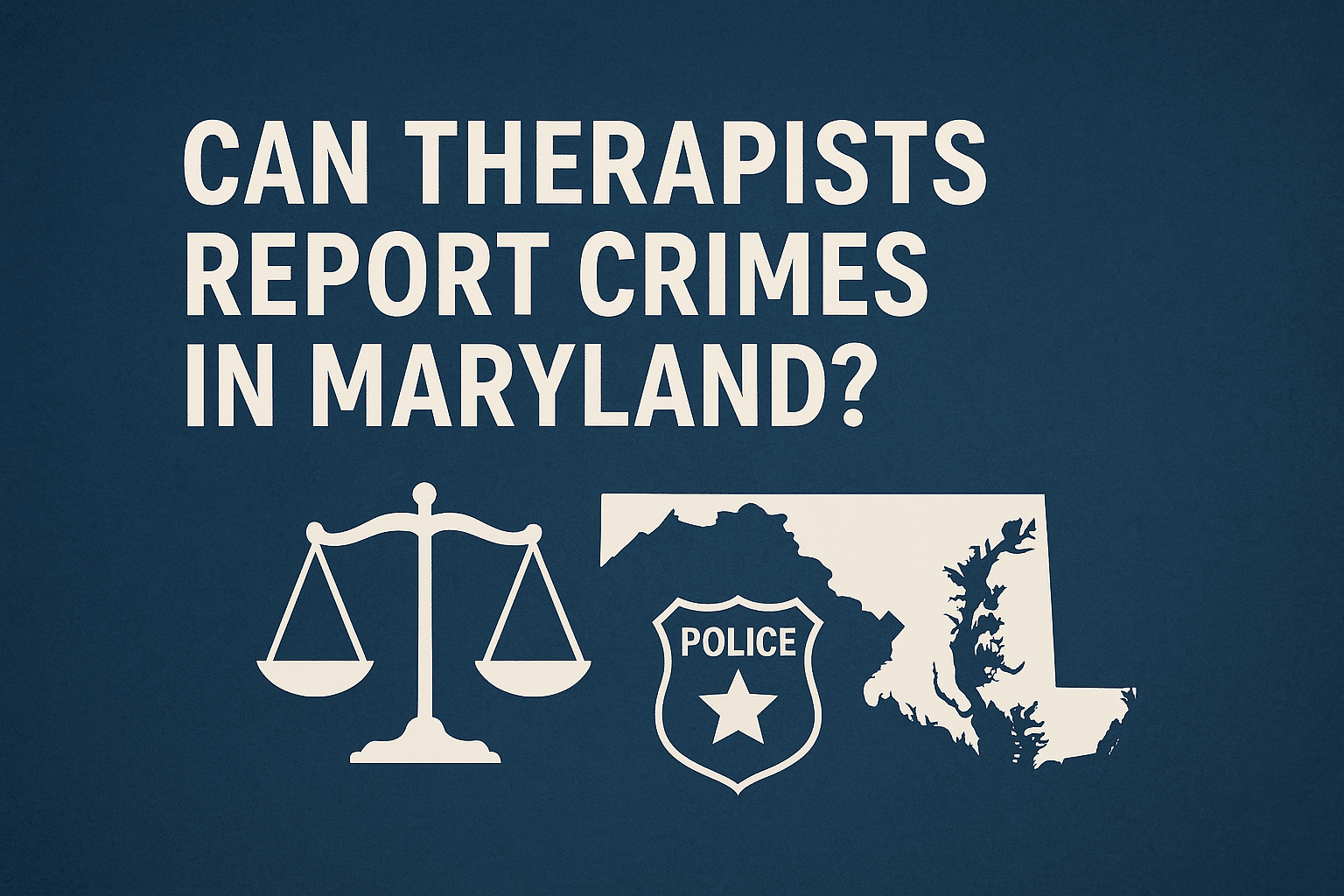
Therapists play a critical role in mental health treatment—but they also have legal and ethical duties when it comes to confidentiality and public safety. If you’re wondering whether a therapist can report a crime in Maryland, the answer depends on what kind of crime, when it occurred, and whether anyone is at risk now.
Confidentiality Is the Default Rule
Under Maryland law, licensed therapists, counselors, psychologists, and social workers are bound by strict confidentiality rules. These rules protect private information disclosed during therapy—even when the person admits to a crime.
For example, if a client tells a therapist they committed theft years ago, the therapist is generally not allowed to report that crime to law enforcement. Past criminal acts, without an ongoing or imminent threat, are usually protected by the psychotherapist-patient privilege.
But there are important exceptions.
When Therapists Can or Must Report Crimes in Maryland
1. If There’s a Threat of Serious Harm
Maryland recognizes the “duty to warn or protect,” based on the Tarasoff principle. If a therapist believes a client is threatening to seriously harm another person—or themselves—the therapist can break confidentiality.
This applies when:
- There’s an imminent risk of death or serious injury.
- The threat is specific (e.g., a named target).
- The therapist believes the threat is credible.
In such cases, the therapist may notify law enforcement or the potential victim to prevent the harm.
2. Mandatory Reporting of Child Abuse
In Maryland, therapists are mandatory reporters under Family Law § 5-704. They must report suspected child abuse or neglect to:
- The local Department of Social Services, or
- Law enforcement
This duty applies even if the client was the victim years ago or if the client admits to being the abuser. Therapists cannot remain silent in these situations.
3. Reporting Elder or Vulnerable Adult Abuse
Maryland also requires reporting of abuse or neglect of vulnerable adults, including the elderly or disabled, especially in assisted living or nursing facilities. Therapists must file a report if they:
- Suspect abuse or exploitation
- Believe the victim is unable to protect themselves
4. Court Orders and Subpoenas
A therapist’s records can be subpoenaed in court—though Maryland courts usually uphold the mental health privilege unless there is a compelling reason to override it. In criminal cases, the defense may move to suppress any improperly disclosed therapy records.
When Therapists Cannot Report Crimes
Absent one of the exceptions above, therapists in Maryland cannot voluntarily report:
- A client confessing to a past crime (e.g., drug use, assault, theft)
- Participation in a conspiracy or illegal act that has ended
- General discussions of criminal behavior with no threat of future harm
Doing so would likely be a violation of confidentiality and expose the therapist to professional discipline or legal liability.
What If a Therapist Reports You to Police?
If your therapist reports you to police and it wasn’t legally justified, it could raise serious Fourth and Fifth Amendment issues. Any evidence obtained might be suppressed, and your rights may have been violated.
If you’re facing charges after something you said in therapy was reported, speak to a Southern Maryland criminal lawyer right away. These cases are highly fact-specific and may involve challenges to how the evidence was obtained.
Facing Charges After a Confidential Disclosure?
If something you shared in therapy is now being used against you in Charles, Prince George’s, Calvert, or St. Mary’s County, don’t face it alone. Contact Southern Maryland Criminal Defense for a free consultation. We’ll review the facts, protect your rights, and fight to keep improperly obtained evidence out of court.
